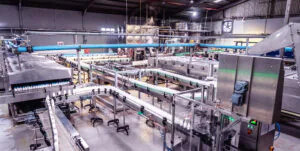Key takeaways
- Biotechnology’s rapid progress is reshaping healthcare, with AI-driven drug development and RNA technology leading the charge.
- Breakthroughs in treating genetic disorders like sickle cell disease and beta-thalassemia are on the horizon, thanks to advancements in T-cell engineering and stem cell technology.
- Bioprinting and tissue engineering, supported by precision gene editing and molecular glues, offer exciting prospects for regenerative medicine.
- Biotech startups, including Enveric Biosciences, are at the forefront of innovation, while microfluidics and biomanufacturing promise to revolutionize therapy development and production.
With each passing year, biotechnology is catapulting into a highly developed and innovative industry. Biotechnology is the application of biology to create new products, methods and organisms to improve human health and society. Biotechnology, also known as biotech, has been in existence since the beginning of civilization, with the domestication of plants and animals, as well as the discovery of fermentation.
This year, the biotech industry will reach the early stages of what has been popularly termed as a ‘renaissance in healthcare.’ Breakthroughs in science are making highly personalized medicine a reality, and new approaches that harness the immune system to fight serious diseases are being regularly developed. As a matter of fact, what has been a part of science fiction in the past is now slowly becoming the new biotechnology trend. This speaks volumes about how far the biotech industry has progressed. Success in today’s biotech marketplace requires companies to continually reassess strategic directions, anticipate, and absorb change and move with deliberate speed. Here is a look at the top trends in biotechnology to look out for in 2024:
Key Developments in Biotechnology

#1 Biotechnology trends: Personalization of medicines
The biotech industry has been through two eras of target customers – firstly doctors as target customers and the second being insurance companies as the target customers. The industry is now on its way to enter the third era- the consumer era. What is influencing such trends in biotechnology? One of the main reasons for this change is the rise in the number of people showing interest in the drug industry due to the growing focus on individual medicines. For instance, today some cancer treatments use drugs that are specifically made for each patient. Therefore, personalization is one of the most popular biotechnology trends to watch out for this year. Gaining a greater understanding of the human genome and our own biology will bring more opportunities to create individual treatments in the future.
#2 Biotechnology trends: Silicon biology
All technologies and products evolve back and forth from a vertical, integrated structure to a horizontal, modularized structure. Currently, the biotech pharma environment is highly integrated, although parts are increasingly modular. However, there are very few technology suppliers with almost the same market power as integrated pharma and biotech companies. Eventually, organizational and technological forces will push towards horizontal and modular structures due to niche competitors attacking distinct industry segments. Modularization is one of the most promising trends in biotechnology. Though biology is currently thought of as too complex for silicon-type modeling, mass amounts of data combined with an exponential increase in computational power could work in favor of the industry.
#3 Biotechnology trends: Recruitment for specialized skill-sets
Rising demand for specialized and skilled workforce is one of the popular biotechnology trends. Therefore, there is a recruitment boom in the biotech sector, and this is going to be a continuing trend in biotechnology throughout 2024. People are now moving from established companies to better opportunities that look promising in new biotech ventures. This will result in increased fluidity between small biotech companies and big pharmaceutical companies.
#4 Biotechnology trends: Safeguarding quality
One of the concrete trends in biotechnology that was prevalent in 2023 and is expected to make its way through 2024 is the fact that biotech ventures are looking to control early development to avoid sub-optimal products on the market. There has been a boom in funding in this sector over the last two years. This has filled the drug pipeline and brought a significant number of drugs to the public, but many of them are sub-optimal. This year, there will be more of a discerning eye from pharma companies to ensure only top-level drugs are brought to market.
What are the challenges in the biotech industry?
Regulatory Hurdles:
Biotech products, such as new drugs or gene therapies, must undergo extensive testing to demonstrate safety and efficacy. This often involves multiple phases of clinical trials, which can be time-consuming and expensive. Regulatory agencies like the FDA in the United States frequently update their guidelines and requirements, creating uncertainty for biotech companies and potentially causing delays in product development. Navigating regulatory requirements in different countries can be complex. Biotech companies need to adapt to varying standards and ensure compliance with each region’s regulations.
High Research and Development Costs:
Many biotech projects do not make it to market due to scientific or clinical setbacks. This means that a significant portion of R&D investments may not yield a return. Cutting-edge technologies and therapies often require substantial investments in research, specialized equipment, and skilled personnel. These costs can strain company budgets. Even successful products can face pricing pressures, especially when they address rare diseases, leading to debates over the affordability of life-saving treatments.
Ethical and Social Concerns:
Technologies like CRISPR-Cas9 have sparked ethical debates about the potential to modify human genes. There are concerns about unintended consequences and the creation of designer babies. The collection and use of genetic and health data in biotech applications raise privacy concerns. Ensuring data security and informed consent is a challenge. The availability and affordability of biotech innovations can be unequal, leading to disparities in healthcare access. Ensuring equitable distribution of new therapies is a complex issue.
Future of AI in Biotechnology
The future of AI in biotechnology promises transformative advancements across various domains, significantly impacting drug development, genetic research, and clinical applications. AI-driven innovations are poised to revolutionize how we approach and solve complex biological challenges.
Drug Discovery and Development
AI is accelerating the discovery of new drugs, such as GLP-1 drugs and Lipitors, by analyzing vast datasets to identify potential compounds with high efficacy and minimal side effects. AI algorithms can predict molecular interactions, optimize drug formulations, and streamline preclinical and clinical trials. This rapid identification and optimization process is crucial for bringing effective drugs to market faster.
Genetic Disorders and RNA Technology
AI’s integration with RNA technology is pivotal in understanding and treating genetic disorders like sickle cell disease and beta-thalassemia. By analyzing genetic data, AI can identify mutations and predict disease progression, enabling personalized treatment strategies. Gene editing technologies, such as CRISPR, benefit from AI’s precision in targeting and modifying specific genetic sequences, offering potential cures for these debilitating conditions.
Cellular and Molecular Innovations
AI is enhancing our understanding of cellular functions and interactions, particularly concerning mitochondria, the powerhouse of the cell. By studying mitochondria’s role in aging and energy expenditure, AI can identify new therapeutic targets to combat age-related diseases. Innovations like molecular glues, which facilitate targeted protein degradation, are being refined with AI to develop novel therapeutic agents.
Immunotherapy and Stem Cell Technology
AI is instrumental in advancing immunotherapy, particularly in engineering T-cells to fight cancer more effectively. By optimizing T-cell receptor designs, AI can enhance the body’s immune response to tumors. Similarly, AI is revolutionizing stem cell technology and tissue engineering, enabling the development of bioprinting techniques to create organoids and tissues for transplantation and research purposes.
Biotech Startups and Innovation
The biotech startup landscape is thriving with AI-driven companies like Enveric Biosciences, which are pioneering new approaches in drug discovery and mental health treatments. AI supports these startups by providing tools for rapid prototyping, simulation, and predictive modeling, reducing time and costs associated with traditional research methods.
Clinical Trials and Personalized Medicine
AI enhances the efficiency of clinical trials by identifying suitable candidates, predicting outcomes, and monitoring adverse effects in real-time. This leads to more effective and personalized treatment plans, improving patient outcomes and reducing trial durations. The integration of AI in personalized medicine ensures that treatments are tailored to individual genetic profiles, lifestyle, and environmental factors.
Tissue Engineering and Bioprinting
The future of tissue engineering and bioprinting is bright, with AI enabling the precise design and fabrication of complex biological structures. AI algorithms can optimize the printing process, ensuring the correct placement of cells and materials to create functional tissues and organs, which hold promise for regenerative medicine and transplantation.
Gene Editing and Beyond
AI’s role in gene editing is expanding, providing tools to enhance the accuracy and efficiency of techniques like CRISPR. By predicting off-target effects and optimizing guide RNA designs, AI ensures safer and more effective genetic modifications. This has profound implications for treating genetic disorders and advancing synthetic biology.
Want to know more about the major biotechnology trends of 2024

Conclusion
The rapid evolution of biotechnology continues to shape the landscape of healthcare and medicine, ushering in an era of unprecedented innovation and personalized treatment options. Breakthroughs in drug development, fueled by AI-driven insights and RNA technology, hold promise for tackling complex genetic disorders such as sickle cell disease and beta-thalassemia. Advancements in T-cell engineering and stem cell technology pave the way for more effective immunotherapy and regenerative medicine approaches. Bioprinting and tissue engineering, supported by molecular glues and precision gene editing techniques, offer new avenues for creating functional tissues and organs. In this dynamic environment, biotech startups like Enveric Biosciences are driving forward with cutting-edge research and disruptive technologies, while the integration of microfluidics and biomanufacturing processes further revolutionizes the field. As we venture into the future, the convergence of these innovations holds the potential to redefine healthcare through precision medicine and transformative therapies tailored to individual needs.




